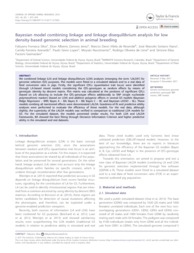Bayesian model combining linkage and linkage disequilibrium analysis for low density-based genomic selection in animal breeding.
Bayesian model combining linkage and linkage disequilibrium analysis for low density-based genomic selection in animal breeding.
Autoria: SILVA, F. F.; JEREZ, E. A. Z.; RESENDE, M. D. V. de; VIANA, J. M. S.; AZEVEDO, C. F.; LOPES, P. S.; NASCIMENTO, M.; LIMA, R. O. de; GUIMARÃES, S. E. F.
Resumo: We combined linkage (LA) and linkage disequilibrium (LDA) analyses (emerging the term ?LALDA?) for genomic selection (GS) purposes. The models were fitted to a simulated dataset and to a real data of feed conversion ratio in pigs. Firstly, the significant QTLs (quantitative trait locus) were identified through LA-based mixed models considering the QTL-genotypes as random effects by means of genotypic identity by descent matrix. This matrix was calculated at the positions of significant QTLs (based on LA) allowing to include the QTL-genotype effects additionally to SNP (single nucleotide polymorphism) markers (based on LDA) and additive polygenic effects in several GS models (Bayesian Ridge Regression ? BRR; Bayes A ? BA; Bayes B ? BB; Bayes C ? BC and Bayesian LASSO ? BL). These models combing all mentioned effects were denominated LALDA. Goodness-of-fit and predictive ability analyses were performed to evaluate the efficiency of these models. For the real data, although slightly, the superiority of the LALDA models was verified in comparison to traditional LDA models for GS. For the simulated dataset, the models presented similar results. For both LDA and LALDA frameworks, BA showed the best fitting through Deviance Information Criterion and higher predictive ability in the simulated and real datasets.
Ano de publicação: 2018
Tipo de publicação: Artigo de periódico
Unidade: Embrapa Florestas
Palavras-chave: x
Observações
1 - Por padrão são exibidas publicações dos últimos 20 anos. Para encontrar publicações mais antigas, configure o filtro ano de publicação, colocando o ano a partir do qual você deseja encontrar publicações. O filtro está na coluna da esquerda na busca acima.
2 - Para ler algumas publicações da Embrapa (apenas as que estão em formato ePub), é necessário ter, no celular ou computador, um desses softwares gratuitos. Sistemas Android: Google Play Livros; IOS: iBooks; Windows e Linux: software Calibre.
Acesse outras publicações
Acesse a Base de Dados da Pesquisa Agropecuária (BDPA) para consultar o acervo completo das bibliotecas da Embrapa.

